It’s raining likes
Instant gratification that social media provides can be detrimental to mental health

Popular online platform, Instagram is testing removing like counts from people’s posts. The move started a discussion on how instant gratification that social media provides can be detrimental to mental health. Gulf News readers discuss.
Vanity
Obsessing over the number of ‘likes’ on a post is unhealthy
Mirror mirror on the wall: who is the fairest of them all? Is a well-known line from a fairy-tale, a myth of the fictitious world. Yet, it can be seen as a reflection of the world’s preoccupation with vanity. In a world full of likes and comments mental health seems to be affected in a detrimental way.
People seem to have an obsession with how beautiful or appealing they are. Consequently, the number of likes act as an assurance of our self-image, self-esteem and self-worth. It may act as a motivator and an aspiration to succeed for a few. On the other hand, it acts as an agent, which reveals the narcissistic qualities of the human mind. If the desire to be admired is not fulfilled, high stress, social unacceptance and manic depression can be a daunting outcome.
There is a desperate need by the producers and consumers of content on such platforms to be more cautious about their usage of social media.

There is a desperate need by the producers and consumers of content on such platforms to be more cautious about their usage of social media. By making the number of likes hidden or disabling the comments to someone’s picture, a constructive society could be built.
From Ms Aymen Ali
Pupil based in Ajman
Use responsibly
People need to use social media sensibly
Social media use may range from a routine check on the platforms, to excessive and ritualistic use. Users may become addicted to these rituals for example, likes and comments giving a sense of fulfilment and gratification. Failure to achieve these may lead to emotional issues like depression, anxiety, insomnia, low concentration and self-esteem issues. Clients with social anxiety issues may avoid human contact and consider social media as the only socialising platform. Users may disrupt their sleep cycle leading to sleep issues.
It is important to note that the effects of social media on mental health may not be same for every individual. A direct correlation is difficult to make.
It is important to note that the effects of social media on mental health may not be same for every individual

Social media can be used in a healthier manner to stay in contact with family and friends, making positive relationships and to forward important messages amongst other uses. Establishing monitoring systems to identify and penalise individuals using socially unacceptable comments may make it a healthier environment. In my opinion, there is a role to be played by parents, care-givers in case of children; and by people themselves to ensure that social media is used sensibly.
From Dr Shankar Srinivas Kuchibatla
Consultant psychiatrist based in Dubai
Obsessive behaviour
Don’t blame platforms, blame people
Some people think that a high number of likes on a photo proves that they are popular and liked by others, which makes them obsess over the amount of likes they get on a picture and that’s unhealthy behaviour.
I don’t think such aspects of social media need to be taken that seriously. For example, if someone has not liked a post of mine, I would understand their own reasoning for it. I believe that social media can be used in a positive manner. People need to avoid obsessing over the amount of likes or interactions they get, not be addicted to constantly check their timelines and not use their accounts to stalk others.
People need to avoid obsessing over the amount of likes or interactions they get, not be addicted to constantly check their timelines and not use their accounts to stalk others.

Personally, I don’t agree that social media platforms should be held accountable as there is a massive number of people that use their applications and they won’t be able to cater to everyone’s needs. Whereas, I do think that all the responsibility should fall on the user as they should be aware of their own actions and not blame it on the developers.
From Mr Ali Khalid
Dubai resident
Poll results
Has the instant gratification that social media provides affected your mental health?
Yes: 69%
No: 31%
Have your say
Is it the responsibility of social media platforms to create a healthier environment for individuals?
Do you think it’s people’s responsibility to use such platforms sensibly?
Sign up for the Daily Briefing
Get the latest news and updates straight to your inbox



